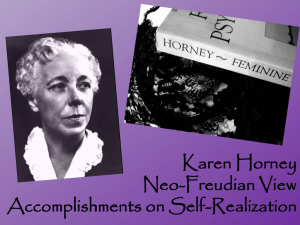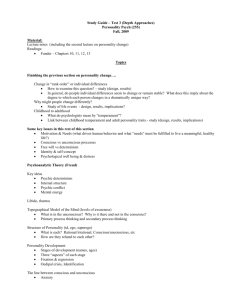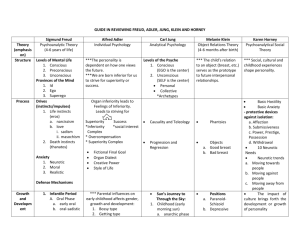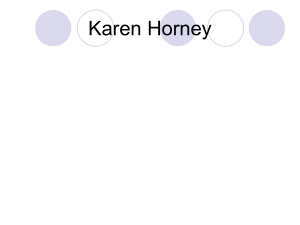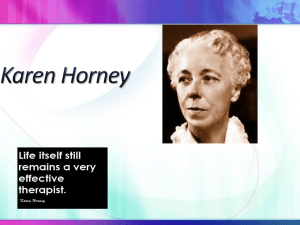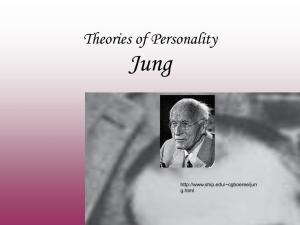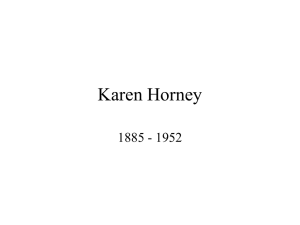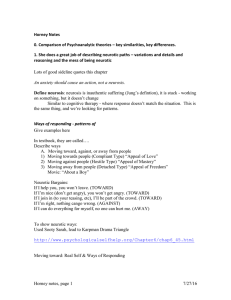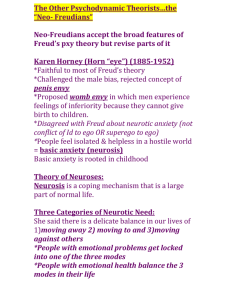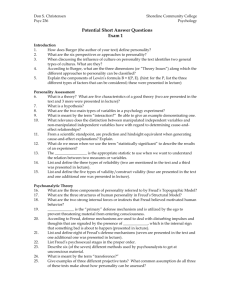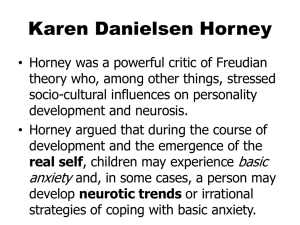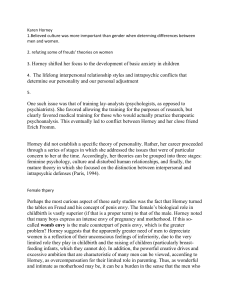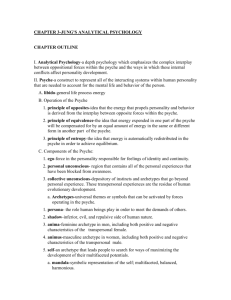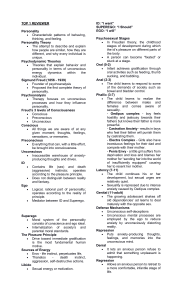Sociocultural Paradigm Karen Horney
advertisement
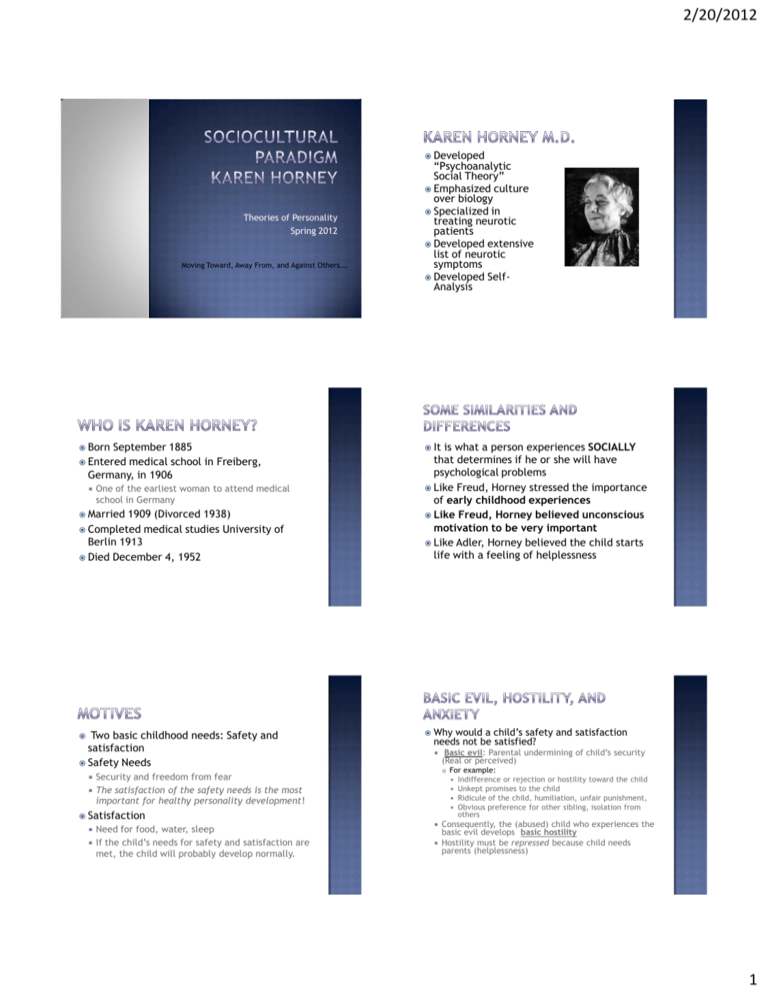
2/20/2012 Developed Theories of Personality Spring 2012 Moving Toward, Away From, and Against Others…. Born September 1885 medical school in Freiberg, Germany, in 1906 Entered One of the earliest woman to attend medical school in Germany Married 1909 (Divorced 1938) medical studies University of Berlin 1913 Died December 4, 1952 Completed Two basic childhood needs: Safety and satisfaction Safety Needs “Psychoanalytic Social Theory” Emphasized culture over biology Specialized in treating neurotic patients Developed extensive list of neurotic symptoms Developed SelfAnalysis It is what a person experiences SOCIALLY that determines if he or she will have psychological problems Like Freud, Horney stressed the importance of early childhood experiences Like Freud, Horney believed unconscious motivation to be very important Like Adler, Horney believed the child starts life with a feeling of helplessness Why would a child’s safety and satisfaction needs not be satisfied? Security and freedom from fear The satisfaction of the safety needs is the most important for healthy personality development! Satisfaction Need for food, water, sleep If the child’s needs for safety and satisfaction are met, the child will probably develop normally. Basic evil: Parental undermining of child’s security (Real or perceived) For example: Indifference or rejection or hostility toward the child Unkept promises to the child Ridicule of the child, humiliation, unfair punishment, Obvious preference for other sibling, isolation from others Consequently, the (abused) child who experiences the basic evil develops basic hostility Hostility must be repressed because child needs parents (helplessness) 1 2/20/2012 Basic anxiety : The generalization of basic hostility to the world Convinced that everything and everyone is potentially dangerous A child with basic anxiety is well on the way to becoming a neurotic The neurotic will concentrate on just one of many needs to the exclusion of other important needs Note - both normal and neurotic people have needs, for example a need for affection and approval , a need for power, etc A. Ten strategies for coping with basic anxiety (neurotic trends) 1. Need for affection and approval 2. Need for a partner who will run one’s life 3. Need to live one’s life within narrow limits 4. Need for power 5. Need to exploit others 6. Need for social recognition and prestige 7. Need for personal admiration 8. Need for ambition and personal achievement 9. Need for self-sufficiency and independence 10. Need for perfection and unassailability toward others need for affection and approval Urge to be loved, wanted Manipulate others to achieve goals Think of self as helpless Need for partner who will run one’s life Suppress desires to control, exploit others Lives one’s life within narrow limits Horney identified ten patterns of (neurotic) needs and then organized them into three categories, each with its own coping strategy. 1. Moving toward people (the compliant personality type) 2. Moving against people (the hostile personality type) 3. Moving away from people (the detached personality type) Move Move Intense Situations against people viewed as “what can I get out of it”? Survival of the fittest self as superior Need for power Need to exploit others Ambition and Achievement Driven to succeed to compensate for feelings of insecurity, anxiety See 2 2/20/2012 Move away from others to become self-sufficient Need for perfection Desire for privacy Maintain emotional distance Neurotic Lopsided personality development as 1 strategy usually dominates (other 2 may be present to lesser degree) Core of neurosis Strive Experience very intense conflict Normal Has much more flexibility Tend to move toward, move against, and move away from people in appropriate and balance ways The Three Neurotic Personality Styles of Karen Horney The Three Neurotic Personality Styles of Karen Horney If I give in, I shall not be hurt I should be sweet, self-sacrificing, saintly Compliant Charlie Brown If I have power, no one can hurt me I should be powerful, recognized, a winner Aggressive Lucy If I withdraw, nothing can hurt me I should be independent, aloof, perfect Detached Snoopy If I give in, I shall not be hurt I should be sweet, self-sacrificing, saintly Compliant Rose (Two and a Half Men) If I have power, no one can hurt me I should be powerful, recognized, a winner Aggressive Charlie (Two and a Half Men) If I withdraw, nothing can hurt me I should be independent, aloof, perfect Detached Alan (Two and a Half Men) Smee Captain Hook Peter Pan Lucy (I Love Lucy) Tony Soprano (The Soprano's) Mel (Melissa & Joey) Rachael (from Friends) Helga Pataki (hey Arnold) Phoebe Emily (Gilmore Girls) Luke (Gilmore Girls) Mike (Doonesbury) Mark or BD Zonker Eli Loker (Lie to Me) Ria Torres (Lie to Me) Dr. Cal Lightman (Lie to Me) Jane Bennet (from Pride and Prejudice) Elizabeth Bennet/Mr. Darcy Mr. Bennet Ethan (General Hospital) Sonny & Jason (General Hospital) Spinelli (General Hospital) Melanie & Ashley (GWTW Scarlett O'Hara & Rhett Butler Scarlett's parents Ariel's sisters (Little Mermaid) Ursula (Little Mermaid) Ariel (Little Mermaid Kel (kennan and Kel) Roskolnikov (Crime and Punishment) The 7 Dwarfs Daphne Fred Velma Charlie Bucket Veruca Salt Willy Wonka Tara Knowles (Sons of Anarchy) Jackson 'Jax' Teller (Sons of Anarchy) Juice (Sons of Anarchy ) Hermione Granger Draco Malfoy Harry Potter Rita (Dexter) Dexter (Dexter) Lt. Maria LaGuerta (Dexter) Cindy Brady Marcia Brady Jan Brady Claudia Joy Holden (Army Wives) Roxie Lablanc (Army Wives) Denise Sherwood (Army Wives) Lexie Grey (Grey's Anatomy) Alex Karev (Grey's Anatomy) Christina Yang (Grey's Anatomy Pam (The Office) Dwight (The Office) Stanley (The Office) Winnie the Pooh Rabbit Eeyore Harry Potter Professor Snape Ashley (Secret Life) Buttercup (Princess Bride ) Vizzini (Princess Bride) Westley (Princess Bride) Guinan (Star Trek) Lieutenant Worf (Star Trek) Captain Picard (Star Trek) Jimmy Palmer (NCIS) Tony Dinozzo Ziva David Dr. Wilson (House) Detective Tritter (House) Dr. House (House) Kristen Cohen (The O.C.) Julie Cooper ( The O.C.) Ryan Atwood (the O.C.) Julia McNamara Christian Troy Matt McNamara Christine Crawford (daughter) Joan Crawford (Mommy Dearest) All the husbands/boyfriends Each person is born with a healthy real self Intrinsic motivation (a force) to grow toward “Self Realization” SR is the experience of truthfulness, productivity, and harmonious relationships with fellow humans If people live in accordance with their real selves they are on the road to self realization! They will develop into a normal, flexible adult. Rory (Gilmore Girls) 1. Normal people live in accordance with the real self Real self is built on flexible, realistic assessment of one’s abilities Remember - living this way leads to self-realization 2.Neurotic people do not live in accordance with the real self The real self is perceived as lowly and despicable. Why? Basic evil leads to creation of the idealized self Inflexible, unrealistic self appraisal Problems result when the real self is replaced by the idealized self as a guide for living. Life is governed by the tyranny of the should 3 2/20/2012 Tyranny of the should (life directed by unrealistic self-image) Used by neurotics to attain the idealized self Deny true self and behave in terms of what we think we should be doing Internal processes experienced as if they are outside the self (a process of selfelimination) See causes of bad things as outside themselves See causes of good things as outside themselves Reduce conflict caused by discrepancy between ideal self and actual self Related to projection but more general Leads to overvaluing and dependency on external factors Wait there is more to ‘artificial harmony ‘ than externalizing….. A. Living according to idealized self-image leads to series of lies B. Seven unconscious devices used by neurotics 1. Blind spots (ignoring factors not in accordance with idealized self) Which dm does this remind you? 2. Compartmentalization (situational rules and ethics) 3. Rationalization (logical, plausible justifications, and excuses) 4. Excessive self-control (controlling expression of emotion) 5. Arbitrary rightness (rigid dogmatism) Belle views herself as being extremely intelligent and overlooks several instances when people have said that she has the brains of a seedpod. This is an example of ? Guard against anxiety by maintaining rigid self control at all costs Worst thing a person can be is indecisive or ambiguous> 6. Elusiveness (indecision and lack of commitment) Avoid being wrong by not making decisions! Opposite of arbitrary rightness 7. Cynicism (failure to believe in anything) Early agreement with Freud, but later emphasized cultural factors For example, she contented that a source of trouble in marriage was the remnants of the male and female oedipal complexes Womb envy (early writings) The incest prohibitions interfered with long lasting positive sexual relationships within marriage She advised to increase the probability of marriage lasting, marry someone as different form your parent of the opposite sex as possible Men envy the capacity for female motherhood Resent that they are expected to perform during sexual intercourse Have deeply hidden anxiety about the size of their penises 1. Blind spots (ignoring factors not in accordance with idealized self) 2. Compartmentalization (situational rules and ethics) 3. Rationalization (logical, plausible justifications, and excuses) 4. Excessive self-control (controlling expression of emotion) 5. Arbitrary rightness (rigid dogmatism) 6. Elusiveness (indecision and lack of commitment) 7. Cynicism (failure to believe in anything) Revised psychoanalysis to include psychological conflicts found in the traditional ideal of womanhood and women’s roles Rejected all versions of anatomy is destiny and instead accepted the cultural determination of personality Horney and penis envy Later, refuted Freud's idea of penis envy Women feel inferior due to cultural inferiority Women do not want to be more masculine! What women want is independence, to freely participate in their culture and to have the same privileges' as men. Women envy men’s cultural power and mobility not their penis. “Power envy” 4 2/20/2012 Techniques: Borrowed from Freud Major Case study, free association, dream analysis, instances of transference Purpose of techniques Used to discover which adjustment strategy a patient was using Greater interest in transference as clue to adjustment strategy Hostile – attempts to dominate therapist Detached –waits for therapist to provide ‘cure’ Compliant- uses pain and suffering to gain sympathy and help Bring patient back to real self Guide patients toward self-realization Responsibility Making decisions and accepting consequences of those decisions Recognizing obligations to other people Inner dependence Living in accord with one’s own values Respecting the right of others to do the same Spontaneity of feelings Able to honestly experience one’s own love, hate, happiness, sadness, fear, or desire Wholeheartedness To be without pretense, emotionally sincere To put the whole of one’s self into one’s feelings, work, beliefs Tasks for Patients Being completely honest Understanding unconscious influences in one’s life Changing one’s disruptive ‘attitudes’ (compliant, hostile, detached) Obstacles Externalization is a major obstacle to effective therapy Essential to become an effective therapist some people can be successful with self analysis Believe Free association, transference, and the overcoming of resistances still very important in self analysis! 5 2/20/2012 The International Karen Horney Society http://plaza.ufl.edu/bjparis/ 6

